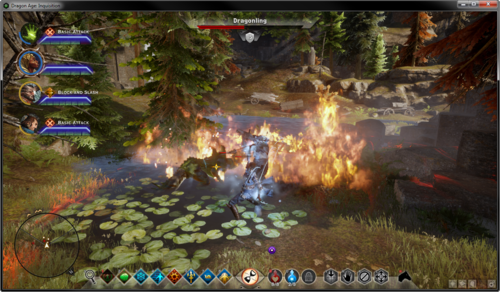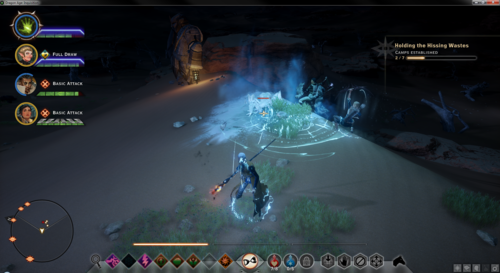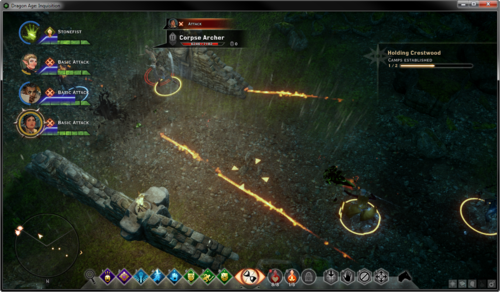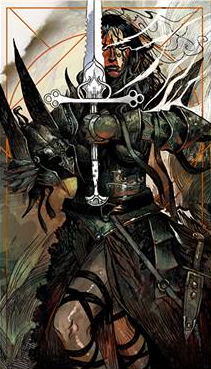Trending
Opinion: How will Project 2025 impact game developers?
The Heritage Foundation's manifesto for the possible next administration could do great harm to many, including large portions of the game development community.

Featured Blog | This community-written post highlights the best of what the game industry has to offer. Read more like it on the Game Developer Blogs or learn how to Submit Your Own Blog Post
Dragon Age removed infinite sustain in favor of temporary shields, lets talk about how that changes the game's combat.

When the player can heal themselves indefinitely, perhaps because they can heal themselves with spells and have a quickly recharging pool of mana, the goal of the enemy isn't to deal X amount of damage to the player but to deal X amount of damage in Y amount of time. Basically, they want to hurt the player faster than the player can heal themselves. Enemies want to burst down the player, the player's goal however is to slowly chip away at the enormous amount of HP the enemy has in comparison while trying to keep their own HP up.

Burst Damage is when you deal a large amount of damage over a short amount of time, typically followed by no damage as all your spells/abilities are on cooldown. Its counterpart is sustained damage which is continuous amounts of less damage that can really add up over time.
If the player's resources don't deplete in a permanent way then they theoretically have an infinite amount of HP for the enemy to deal with. If the burst damage isn't enough to kill someone, and often times even if it is, the player will be able to heal that damage off and once again be at full health. In this way a rechargeable heal lets the player continually reset the fight in their favor so long as the enemy doesn't have enough burst damage to take all of the player's party members out.
Dragon Age Inquisition wanted to break this cycle, remove the player's ability to infinitely heal and thus reset the fight, so they decided to remove healing spells from the game and replace them with shields.

You do still get potions which can heal the player but you only get a very limited amount of potions. This means you can't buy your way though a fight by buying 50 potions and then chugging them all during the fight. The designers can design a fight around the knowledge that the player will have at most 8 healing potions for any given fight.
Instead you get a spell called "Barrier" which puts a shield on all allies grouped within a smallish area. That shield takes damage in place of the character, but it is on a timer as it depletes on its own fairly quickly. While both heal and barrier share the same function (keeping allies alive) they do it in fundamentally different ways and more importantly at fundamentally different times. Healing someone is reactive, someone takes damage and then you heal them until they are at full health or until someone else has taken even more damage. Someone takes damage and then you heal them. Barrier however is proactive, it must be put on someone before they take any damage or else it is pointless. You cast barrier before anyone takes damage.
When you are choosing who to heal you don't really care about who is about to take more damage unless they are likely to die from that more damage. Mostly you just want to heal whoever's health bar is the lowest. This makes the healer a very passive role, and one with a fair bit of margin for error. Imagine you have two teammates who are <50% HP and you have to choose who to heal. Now ideally you would want to heal the one who is about to take damage (assuming everything else equal) but you for whatever reason guess wrong and heal the safer of the two. Assuming that neither die though you can still heal the other one back up to full heath. You didn't waste the heal, that health is still there on that other character.
With barrier though if you use it incorrectly then someone is going to take damage that won't go away. Casting barrier on a character that doesn't take any damage means you likely cost someone else some HP. Heals are cumulative, you get that HP back permanently which means any mistakes can be erased by more healing. Another way to put it is you are undoing the enemy damage, like it never happened. Barriers on the other hand are temporary, so your screw ups (as defined as your allies taking damage to their HP and not to a barrier) are cumulative because you don't have a sustainable way to get that HP back. With barriers you don't get to undo anything, you are only able to mitigate the enemy's damage.
With this emphasis on proactive action instead of reactive action the decision of who to protect with barrier can be much more complex and interesting than it can be for normal healing. This makes the barrier support role much more interesting to play as. On the other hand it can make the other roles much more frustrating to play as because the healer/support can screw up much more easily now. This makes a mage with barrier both harder to play perfectly and weaker than a mage with heal since they can only mitigate damage and not undo it.

The fact that barrier is harder to use effectively can be VERY frustrating if you are letting the AI handle it and if the AI isn't smart enough to know how to use it well (though I haven't notice that as a particular problem in Inquisition, this is a theoretical problem). True you can baby sit the AI and just tell them what to do every 2 seconds of game time but that can be really boring and repetitive.
This doesn't just change the healer/support role though, it changes how all classes deal with combat. Most noticeably it effects the tank as they are the one who is going to be taking all this damage which makes them the most reliant on the now severely limited healing. So, how does the tank deal with this? What does Dragon Age Inquisition give this class to deal with all this damage in a sustainable form?
Inquisition decided to deal with this by letting the Warrior class generate their own shield and call it "Guard". It works a lot like barrier (it takes damage so the character doesn't) but these two can stack and the guard doesn't fade like barrier does. Warriors have many abilities that generate guard and they are mostly defensive skills that scale with how many enemies are around the Warrior (they get bonuses for being in the middle of the action).
Again you can see they decided to give the player the ability to mitigate damage but not undo it in any kind of sustainable way. You can always generate more guard, but you can never heal back damage done to you unless you use one of the limited potions. The game consistently says that potions are going to be the only way for the player to heal themselves and then puts a strict limit on the number of potions players can get.

There is one warrior specialization, the reaver, that can heal themselves. This specialization grows stronger the less HP they have and the healing they do is in proportion to the amount they are missing. This specialization seems to be the one exception to the "no sustainable healing" rule but they aren't super great at it as they also use health as a resourse to attack which menas the healing is used more to offset damage they do to themselves then to let them tank through the damage others to do them.
The thrid class, rogues, are the least changed by the removal of heal because rogues aren't expected to be doing any tanking like warriors and they also never get access to healing or mitigation spells like mages do. As such rogues don't have guard or any other way to generate some kind of temporary HP they can use to shield them. Instead they are expected to deal with enemies attacking them by going into stealth and dropping aggro or relying on their high dodge stat, neither of which is a change from the previous games.
The removal of heal makes the potions super important as they are the only source of actual healing and not just mitigation. The limit on the number of potions you get doesn't just change combat though, it also changes exploration as you don't get potions on a per fight basis but rather have to get them restocked at various camps. In previous Dragon Age games you would heal fully after every fight but that is no longer the case in Inquisition. Sure, you get all your mana/stamina back but any damage you took or potions you used is carried in between fights. You only have 8 potions so you have to use them wisely and this creates a continuity between fights. You don't just have to plan out a fight, but also how you are going to get there and what you are going to do with the resources you have left after the fight is over.
You restock your potion supply at the numerous camps you set up all over each and every map. The presence of the camps do serve that functional purpose (and you can also change party members here and fast travel to these locations) but they also serve the feel and story of the game. In previous Dragon Age games you were a champion, someone strong going around and kicking in heads. In Inquisition though you are a leader of an army, a movement, and the game focuses on you leading that army and using it to create a presence in various areas in order to try and bring back order.
By having you set up these camps you feel like you are claiming land that you have taken. You don't just feel like a strong group of people walking though random areas but as though you are taking ownership of, or at least responsibility for, the land as you move through it. You aren't just traveling though areas leaving nothing but dead bodies in your wake, you are setting up camps and areas of protection for the locals.
Personally I like how this changes the game, but I get how others might not like it. It is more punishing of mistakes (that doesn't necessarily mean harder) as you no longer have a sustainable way to erase those mistakes, and beyond the fact that this makes the game feel differently there are is also valid concerns about if this system is balanced correctly/fairly, I mean just because a system COULD be good/better doesn't mean it IS good/better. I quite like it though. I feel like it creates a more interesting battles and makes exploration a bit more exciting. I like how it feels like your mistakes matter now and can't be undone.
Does that make sense?
Read more about:
Featured BlogsYou May Also Like